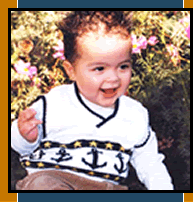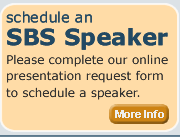

Sign up to receive periodic e-mail alerts, SBS news and special announcements...

|
Taking baby steps to recovery At 7:20 Thursday morning, 15-month-old Hunter Rodriguez awakens in his father's arms. His big browm eyes don't focus and meet his father's gaze like they once did. A nurse pricks his inch-long ring finger to draw blood. She's checking to see if his phenobarbital levels - medicine used to prevent seizures - are safe enough for the Aurora boy to be released today. The boy, who's been at Children's Hospital since Oct. 19, is suffering from shaken-baby syndrome. Now, with continuing therapy, he is ready to go home. "It's like he's a different child," said Michelle Patch, a physical therapist at Children's. She's been working with Hunter for three weeks. "If you were to have even looked at him before, he just was so different." Everyone at the hospital 0 including the physical, occupational and speech therapists and resident doctor - says Hunter has made great strides since he spent his first week at Children's in a coma. And his favorite coaches - parents Greg, 32 and Jacqueline, 28 - have been by his side almost every minute. The shaking, suspected of being inflicted by 29-year-old day care provider Shawna Pint of Aurora, injured Hunter's fragile brain. Earlier this week, authorities charged Pint with felony child abuse. At Children's therapists have spent the past three weeks helping Hunter relearn the skills if an infant: rolling over, sitting up by himself and grabbing toys with both hands. His vision is limited, his neck bobbles unsupported, and his right side droops, almost like a stroke victim's. Four daily therapy sessions have been a constant in the toddler's life for the past three weeks. This was how he spent his last day at Children's: At 8:15 a.m., Hunter is in his flannel polar bear pajamas, struggling with Jacqueline on a hospital bed as she tries to feed him on of two daily doses of his siezure medicine. Now, he's ready for an hour of therapy to work on "fine" motor skills. "Are you ready to play?" says occupational therapist Carole McCoy. "Yeah, yeah, yeah," Hunter replies. McCoy gets him to pull off his socks. McCoy keeps Hunter propped up between her legs. His left arm swings around while his right arm lies limp. And then, for the first time since the injury, he grabs his pacifier with his right arm and sticks it in his mouth. He draws cheers. Jacqueline also gasps when Hunter grabs a shiny silver bell McCoy dangles in front of him. This gives the Rodriguezes hope that maybe their son can see. At 10:15 a.m., after a snack an stroll, it's time for physical therapy, where the focus is on "large" motor skills. Patch and her intern, Rosie Gnoffo, pick Hunter up and take him back to the therapy room. The Rodriguezes have found that if their son thinks they aren't in the room, he is often more cooperative. Patch puts Hunter belly-down on a ball four times his size. She wants him to build his trunk muscles so he can once again hold up his own head and sit without support - as he did before the injury. After the occupational therapy, Patch knows her patient is tired. But she does get him to practice taking steps. Jacqueline and Greg take turns supporting his upper body while Patch pushes his tentative legs, which sometimes get stuck midair. "I know, this is a lot for a little guy," she says. As Hunter is working with Patch, his speech therapist, Sherri Stirbus, comes in. She's trying to build up Hunter's speech skills to where they were before the incident. "Hunter say 'moo'", she says, placing a neon-colored microphone in front of him. Before Oct. 19, Hunter's vocabulary consisted of nearly 10 words. Now, he can say three or four. Stirbus said helping Hunter is challenging. Most of her patients can see and mimic the movements of her mouth. Hunter can't. At 11:30a.m., Hunter takes a nap as his parents meet with his resident doctor and therapists. The Children's team reviews the work Hunter will continue to need once he leaves the hospital. Jacqueline's face beams as she comes out of the meeting and says Hunter is doing well. The Rodriguezes still don't know if he'll make a full recovery, but they're optimistic. His blood work from earlier in the morning showed he's ready to go without phenobarbital. They know they'll need special equipment, like supports in his high chair and car seat. They've also scheduled physical, occupational, speech and visual therapy for days a week. The two are also rearranging their work schedules. For the past month, Greg's co-workers at Pentax have donated their vacation and sick days so he could be with his son. Jacqueline's employer, Oppenheimer Funds, has given her time off. But both must return to work Dec. 14. "It'll just be nice to have our family back," Jacqueline says. She's expecting their second child in May. At 2:30, the Rodriguezes have their last and what may be their most important appointment of the day. The visit Dr. J. Bronwyn Batement, an ophthalmologist. All day Hunter has shown signs that he can see. There was the bell, and while waiting for the eye doctor, he appears to be looking at Greg's face. But after examining him, Batemen gives the couple devastating news: Hunter isn't seeing like a normal child his age. The pain tears into the couple's faces. The Rodriguezes have been told that children who are victims of shaken-baby syndrome temporarily lose their sight because bleeding from the brain obstructs vision. "All we can do is hope and pray," Jacqueline says. At 1 p.m. today, Hunter's parents are expected to bundle him up and take him home from the hospital where he's been since October. He faces many more long hours of rehabilitation. He may never see again. To the Rodriguezes, it doesn't matter. "I guess we're lucky," Greg said. "It could have been a lot worse."
|

Home | Hunter's Story | News Articles | Presentations | FAQ's | Resources | Contact
Site by NolanDigitalArts.com